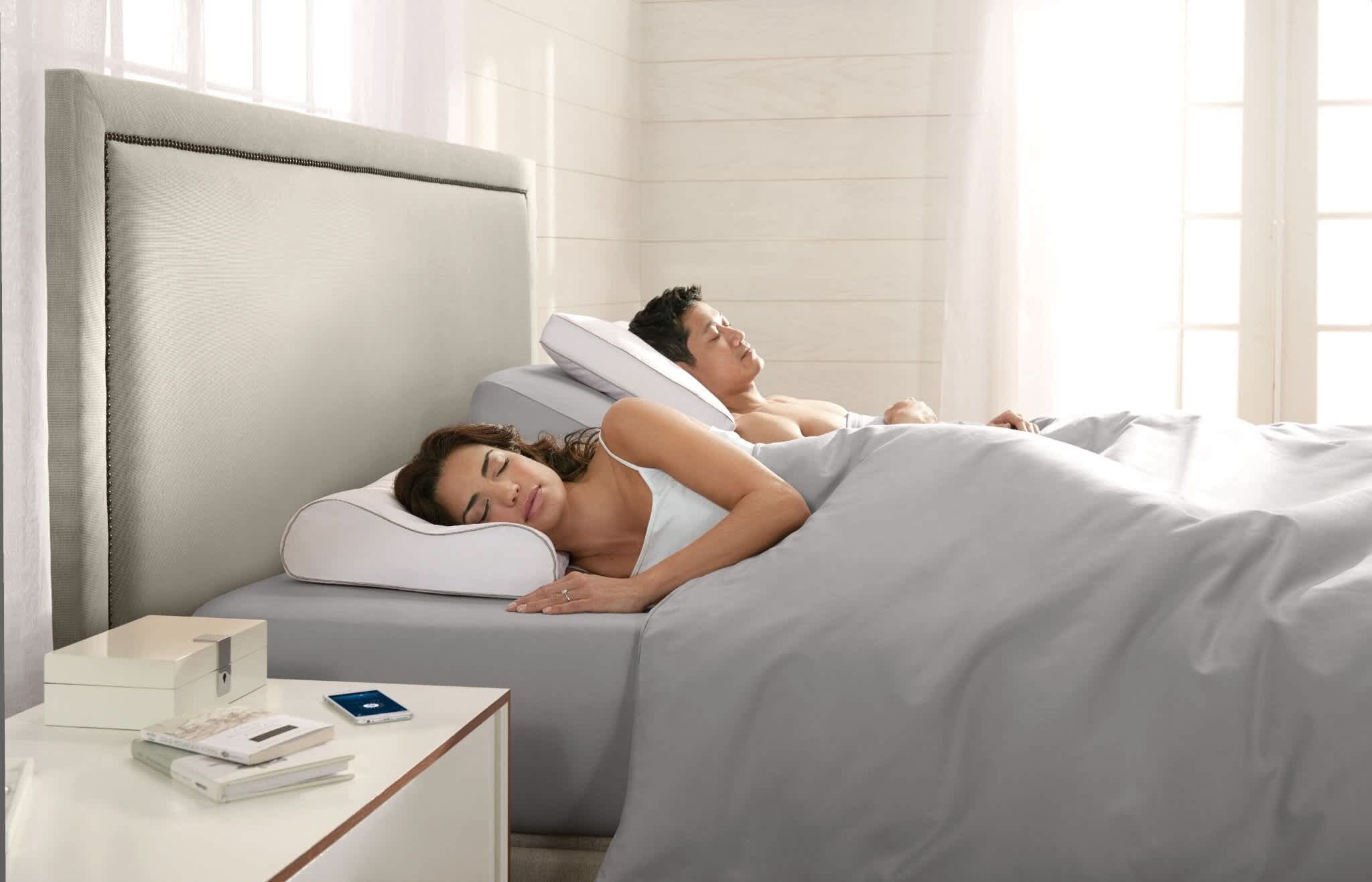What you can do — and what your partner can do — if snoring disrupts your sleep.
HOW SNORING AFFECTS YOUR RELATIONSHIP
Forget arguing over vacations and the checkbook. Snoring can seriously strain relationships between adults who share a bed. The snorer suffers from guilt and shame, as their partner can't sleep and resents their snoring other half, writes sleep expert Michael Breus for Psychology Today.
Poor sleep leads to exhaustion, moodiness and lack of patience. The phenomenon has a scientific name, Dr. Rosenberg notes: "spousal arousal syndrome." One partner may move into another bedroom, he says. (Interesting fact: Male snoring forces female bed partners to sleep in different rooms more often than the other way around, suggest findings published in the Journal of Clinical Sleep Medicine.)
Some couples may enjoy separate beds, but for others, such separation may hinder emotional and sexual intimacy, Breus notes.
"Couples may find themselves having sex less often when they're regularly sleeping apart," he writes. "Partners also may miss the physical closeness of sleeping together, and the emotional bond that it confers for many people."
WHAT CAUSES SNORING?
Let's start with the root of the problem, why do we snore? Snoring occurs when the soft tissues of the throat relax, and the air flowing past causes them to vibrate. Certain anatomy, such as a low, thick, soft palate or long tonsils, may crowd your airway, making you susceptible to snoring, according to the Mayo Clinic. Nasal congestion exacerbates the problem by forcing mouth breathing and increasing throat tissue vibrations. Excess weight is another snoring culprit, says sleep expert Dr. Robert S. Rosenberg, who is board-certified in sleep medicine. The extra fat around the neck narrows the air passage.
Pregnant women have an increased likelihood of snoring, primarily due to weight gain. In a study published in the journal BMC Pregnancy & Childbirth, researchers found that in expectant women, snoring rose from about 8% in the first trimester to 21% in the third trimester.
Smokers also are at a higher risk for snoring. The tobacco habit triggers mucus production and congests the airway — a surefire way to up snoring risk.
Your bedtime routine and sleep habits may contribute to snoring too, explains the Mayo Clinic. For example, banish any nighttime tipple — no alcohol at least two hours before bed. Booze relaxes throat muscles, and those relaxed muscles lead to snoring. Sleeping on your back also promotes snoring, as gravity narrows the airway.
How to Stop Snoring...Whatever Gets You Through the Night
Here are some tips on how to help your partner stop snoring or what to do when you feel as if you are sleeping in the subway:
1. Don't Make it Personal
First of all, take emotions out of the problem, and focus on the physical issue.
"Snoring is an anatomical and physical issue, not an emotional one," says Michael J. Breus, a Los Angeles-based clinical psychologist, sleep specialist and author of The Power of When.
"Couples can keep anger and resentment at bay by keeping the conversation in the physical realm. This includes making the non-snoring spouse's sleep quality a priority," Breus says. "If you're not sleeping well, you're not thinking straight," which can compound the negative emotions that can arise when snoring is a nightly disturbance.
Focusing on the physical and logistical aspects of snoring keeps the non-snoring partner from taking the behavior personally, and stops the snoring partner from feeling that their night noises are a personal failure.
2. Seek the Root Cause of Snoring
Encourage your partner to be evaluated for sleep disturbances such as sleep apnea. If they refuse, record them. Sometimes they will deny that they snore, or that it's not that bad. If they hear their racket, it may shock them into seeking solutions.
3. Ask Your Dentist for Help
Your partner's dentist can make special dental devices to help separate the tissues in the back of the throat to reduce the snoring.
4. Shut Out the Noise
Try ear plugs and a white noise machine. I used to put the machine right in between us. Or build a "pillow wall" between you to absorb some of the sound.
Sometimes, I would even turn and sleep with my head down by my husband's feet. When my head wasn't smack against his, sometimes it muffled the sound just enough. Your bed can also help. Couples can sleep together with snoring solutions from Sleep Number® smart beds.
5. Raise Your Partner's Head
Anything that constricts the nasal passages causes snoring because the air moves too quickly through the nasal cavity. Even a slight shift in head and neck positioning can reorient a person enough to quiet snoring.
Elevate your partner's head with an adjustable base, a foam wedge or extra pillows. A mattress and base like with the Sleep Number® smart beds and FlexFit™ adjustable bases feature different settings for each sleeper, and Partner Snore™ technology gently raises each person's head to help alleviate snoring.*
6. Remind Your Partner Not to Sleep on Their Back
Most people snore when lying on their back. Nudging them in the middle of the night to make them roll over onto their side can work, but it also disrupts your sleep. One idea is for them to wear a T-shirt with a pocket backwards. Put a tennis ball in the pocket; when your partner rolls back, it will remind them not to. Or they can prop themselves on their side with a body pillow wedged at their back.
7. Decongest for Better Rest
Offering your partner options for quieting nightly snoring can help the non-snoring spouse feel empowered and solution-focused. Here are Breus' recommendations:
-
Use a saline nasal spray or neti pot before bed to clear nasal passages.
-
Avoid alcohol, which inflames mucous membranes, for two hours before bedtime.
-
Place an air filter in the bedroom to pull dust or other allergens out of the air – even if your partner isn't aware of any allergies. Also change and wash your pillows and pillowcases often. Collected dust and dust mites might cause an allergic reaction.
-
Sleep with an external nasal strip or internal nasal dilator, available over the counter at drugstores, to help keep nasal passages open throughout the night.
8. Start Doing Mouth Exercises
The Sleep Foundation recommends your snoring partner do what is called oropharyngeal exercises that help keep throat tissue from getting lax and vibrating while asleep. These worked quite well for my husband, who, did I forget to tell you, I really love very much? It didn't eliminate the snoring completely but it brought the noise level down quite a bit. The Snore Lab recommends:
-
Tongue brushing
-
Sliding tip of the tongue back along hard palate
-
Sucking tongue against roof of the mouth
-
Forcing tongue down into the floor of the mouth whilst the tip stays in contact with the lower front teeth
-
Pursing lips
-
Sucking movements with the cheek
-
Using cheek muscles to pull against a finger
-
Elevation of soft palate
9. Try Sleeping in Separate Rooms
Sending one partner – preferably the snorer – to a spare room shouldn't be a stigma, says Breus. In fact, he calls occasional or even regular relocation "an enhancer" for many couples because it allows each partner to arrange the blankets, noise level and sleep position to best fit their comfort level, which means better rest for everyone. If you can't bear being separated, try going to bed before your partner does. Sometimes a head start is all you need.

Get Back to Quality Sleep
My situation resolved itself finally when my husband happened to lose some weight. (Being overweight is a risk factor for snoring because neck fat compresses the upper airway.) Every once in a while he kicks up again, and I try mightily to remind myself this is a physical condition, not intentional. And then we go back to this list, as needed.
Like diet and exercise, quality sleep is essential for optimal wellbeing and performance. Because everyone's sleep needs are different, Sleep Number® smart beds sense your movements and automatically adjust firmness, comfort and support to keep you both sleeping comfortably. Find your Sleep Number® setting for your best possible night's sleep.
*May temporarily relieve common mild snoring in otherwise healthy adults. Partner Snore™ technology is available with Split King and FlexTop® King mattresses on FlexFit™ adjustable bases.
